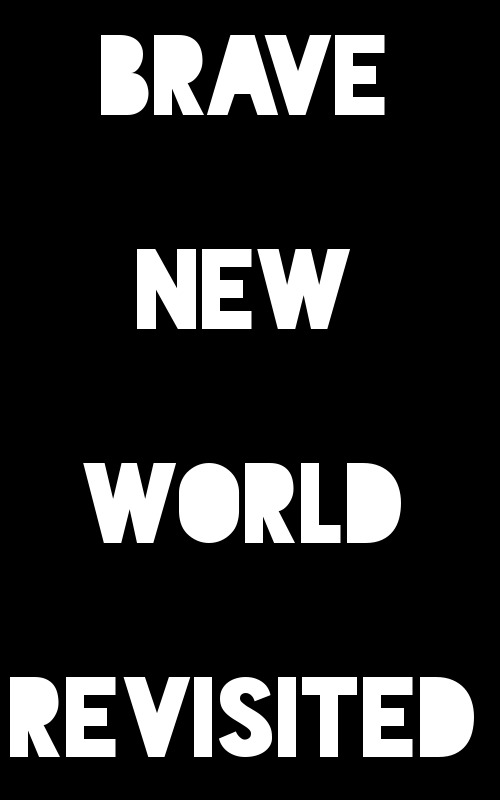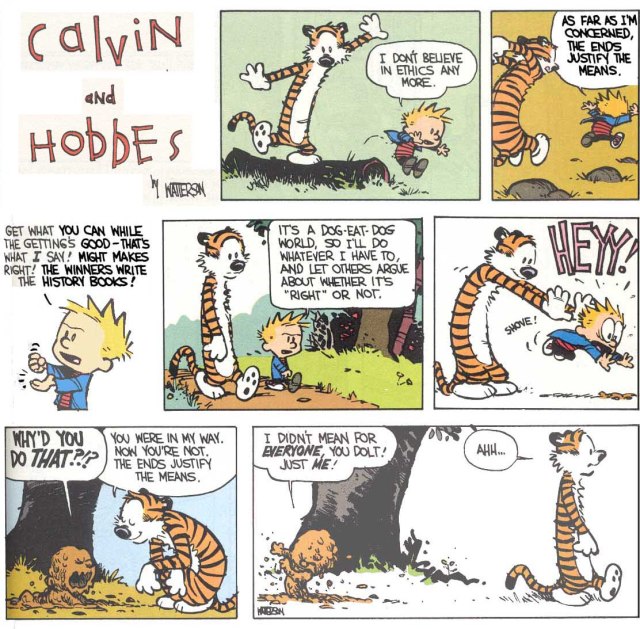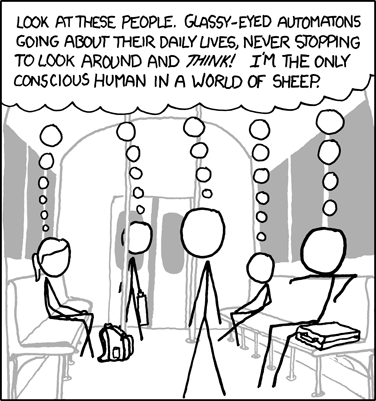Throughout Humanity’s existence, the search for the ‘ideal’ society has been a constant pursuit. Works such as Augustine’s The City of God, and Thomas More’s Utopia all exemplify this struggle intellectually, while individuals such as John Winthrop and Vladimir Lenin show the tragic and horrific results of physical attempts to achieve the perfect society. The problem is separating the intentions from the results, as far too often in the process people lose sight of the goal, and justify atrocities in the name of ‘X’ idea. On more than one occasion, the perfect society has been that justification. Although social progress should not be discouraged, a fine line is created when legislating things such as happiness, morality, and security.
To many, the ideal society is one without pain, alienation, and conflict, and Utopians(and Utilitarians) see civilization as the vehicle to achieve such reality; however, in Brave New World, Aldous Huxley present to us a society with these exact characteristics, and reveals that the modern conception of ‘Utopia’ is very much a philosophical Hell for the Human Condition.
Without Truth
Within Brave New World, it becomes immediately apparent that what is held highest in this Utopian (read: Dystopian) society is the stability and happiness of the collective ‘whole.’ Policies, beliefs, relationships, and everything else is based entirely on the philosophy of John Stuart Mill, known as Utilitarianism. This is done on purpose by Huxley to give reflection to modern-day policy making by those in power, as well as to show those who pursue Utilitarianism their ‘end game.’ Although this Utilitarian ethic makes everyone ‘happy’ in Brave New World, it comes at an incredible cost: the destruction and devaluation of Truth. This conflict is embodied by the discussion between John the Savage and Mustapha Mond, the world controller of Western Europe. John represents other major approaches to ethics in philosophy, namely Virtue Theory. John is astounded, and simultaneously terrified, of the destruction of what he knows to be True, Right, or ‘Ought to Be.’
John, ironically titled the Savage, came from a society that chose to reject the luxuries found throughout the rest of the world. This made John’s society seem rather brutish in the eyes of outsiders, but in the process of rejecting the countless technologies and practices that made living effortless, the ‘Brutish’ society managed to actually live. Far from a perfect world, John’s society had many confusing traditions and rituals that caused pain and suffering to those who lived within it, but it was because of this suffering, this acknowledgement of reality, that allowed them to know true love, happiness, and joy. John and his home understood that there is value in suffering, for it is necessary in order to know authentic joy. All of these were found in John’s alternate world, and are why when confronted with Mustapha Mond, he asked how such a world could be ‘Just.’
The society in Brave New World was engorged in pleasure, but at the cost of not knowing what real, ‘True’ pleasure is. By bypassing pain and struggle, it is impossible to really know what love and happiness is, as John repeatedly attempts to explain to those around him in the horrific new world he found himself in. In the world that chose ignorant bliss in order to never suffer or know pain, a proposal truly tempting to John in the form of the voluptuous Lenina, it could never know the true Virtues of what it is to be Human. This is an elimination of truth entirely. By avoiding the cruel truth, such as losing a loved one and physical pain, we eliminate reality itself from our existence. By effectively creating structures between humanity and the world around them in the most basic of ways, Truth no longer existed in Aldous Huxley’s fictional society.
Mustapha Mond embraces this, by admitting the conflict between happiness and the Truth. In Brave New World, the choice between the two is made clear.
You’ve got to choose between happiness and what people used to call high art. We’ve sacrificed the high art.
Killing the Individual
In Huxley’s world of Utilitarian morality, it really was impossible for John to Exist. For just as impossible as it was for true virtue to be known in absence of struggle, it is impossible for anyone to own themselves in a world of collective good. This Brave New World wanted to eliminate alienation, just as it did pain, and only a homogeneous society could support that. With the exception of classes, which were indoctrinated(denied truth), everyone was the same. From desires to taste, every member of this Utopia shared in consensus what was favorable. With the ‘individual’ out of the way, there was no real margin for differences to exist. Both Gammas and Alphas alike shared the want of emotionless sex and love, the mind obliterating comas induced by soma(an LSD equivalent drug, but more powerful), and the same monotonous existence provided to them by society.
Just as Utilitarianism removed the ability for truth, it took away the ability for anyone to be somebody. It is an ethic based on ‘numbers’ alone, with questions such as “How can we maximize happiness at the smallest expense?’ at its center. Although it may sound as a morally just intention, it removes any consideration for the individual in society and enforces the belief that ‘the end justifies the means.’ No matter how horrific the act, all that matters is the collective good. If that means killing 49% of a population to save the 51%, then it is morally just. If that means programming, brainwashing, and controlling people so that they’re fooled into happiness, then it is morally just. Homogenization via Utilitarianism prevented any individualism, and as a result, made it even more impossible to live a ‘life worth living.’
Only John, representing those other forms of ethics, was aware of the bland commonality that plagued this technocratic society. Such an ability to tell, however, was reserved only for those who were different. Despite the lack of alienation in a world such as Huxley’s, a trait desired by the Utopian, it is now impossible to tell what is living and what is manufactured. Do you love being fashionable because of personal preference, or were you taught to be so? In exchange for perfect unity, everyone was brought down to the lowest common denominator of the Soul. In such a world, those with any individuality, like John, are forced to be the philosophical ‘Other’. Within philosophy, those who are construed as the Other are the people who are excluded from rest of society for being different, be it bad or good. Thus, in Brave New World, those with the capacity to truly understand, feel, and live are effectively the enemy. For in exchange of being permanently alienated from society, John managed to keep his identity, his Soul, and himself.
The price of societal harmony from perfect homogenization in Brave New World was that it became impossible to distinguish an empty shell from human flesh. Utilitarian ethics, when taken to their end, results in a world that reduces every person to a mere statistic to be fed, clothed, and contented. How this goal comes to actual fruition is of little matter.
No longer Human, not yet machine
When you separate from a human its ability to know, feel, and exist, what you have left isn’t human, but a creature. Without pain and alienation, you can finally have no conflict, a true ceaseless peace, but you are left with something that is entirely inhuman. It is in the human condition to want to feel, to be unique, and to fight for what we want; take these traits away, and you have successfully dehumanized whatever Utopia that was created.
John the Savage, although backwards in many aspects to those around him, was the most human in Huxley’s Brave New World. John understood what things such as pain and joy, individuality, and passion were, something that no one in the dystopia around him could ever really understand. The closest comparison for those around John would be the difference between a Sheppard and the lambs, a cowboy and the cattle. Each ‘individual’ in that society was insuperable from the next, no real difference in character to protest their bland state of body and mind. Just as cattle, all they cared for was the next meal, the next sleep, and the next prod in the side directing them where to go.
“But I don’t want comfort. I want God, I want poetry, I want real danger, I want freedom, I want goodness. I want sin.”
“In fact,” said Mustapha Mond, “you’re claiming the right to be unhappy.”
“All right then,” said the Savage defiantly, “I’m claiming the right to be unhappy.”
“Not to mention the right to grow old and ugly and impotent; the right to have syphilis and cancer; the right to have too little to eat; the right to be lousy; the right to live in constant apprehension of what may happen to-morrow; the right to catch typhoid; the right to be tortured by unspeakable pains of every kind.” There was a long silence.
“I claim them all,” said the Savage at last.
Mustapha Mond shrugged his shoulders. “You’re welcome,” he said.
In the process of creating the perfect world, Utilitarians destroy the very subjects it was meant for, a brave new world for no conscious individual. Within the process of removing these key ‘undesirable’ traits – pain, alienation, and conflict – from humanity, Utilitarianism simultaneously robs us of what enables true compassion and understanding. Deprived of their senses and mind, a human really isn’t much a human. All of this is done in the name of security, of both mental and physical health. At the end of the day, the problem is that there isn’t anything left to protect after the surgery is done.
Faced with this world, John was driven to the inevitability of his own death, forever alienated from fellow humans everywhere; however, in John’s brief existence, he was the only human in that brave new world. What is truly ironic is the reaction, for in the climax of John’s death, the rest of the world merely stared with glazed eyes of confusion, as the animals they were.
Imagine All the People Living Life in Peace
What must be understood is that Utilitarianism is the classic “well it sounded good on paper” situation. Everyone wants a world devoid of suffering in theory, but what does that mean in reality? Relationships are amazing things, something nobody should go without, but are we to eliminate these to ensure that no one gets heart broken? How about good literature that makes you feel the entire emotional spectrum? Should clothing be regulated to one type, so that no one feels left out? Nothing is really safe in such a world. Under the Utilitarian framework, individuals are denied agency and become numbers in an equation to be solved; something entirely alien from concepts of Virtue.
Tempting as pursuing and creating Utopia on Earth may be, Aldous Huxley reminds us that agony, individuality, and conflict are all integral to the human condition. A world that eliminates these characteristics takes more from humans that it gives, destroying the very attributes that define us as a species. In Brave New World, we are taught that the civilization that is gutted of its own humanity is not Utopia, but a machine without a ghost.
See Also:
Philosophical Story Challenge of the Week
Throwback Thursday! Brave New World – Aldous Huxley
Brave New World by Aldous Huxley: A Review



I must say you have very interesting posts here.
Your page can go viral. You need initial traffic only.
How to get it? Search for: Etorofer’s strategies